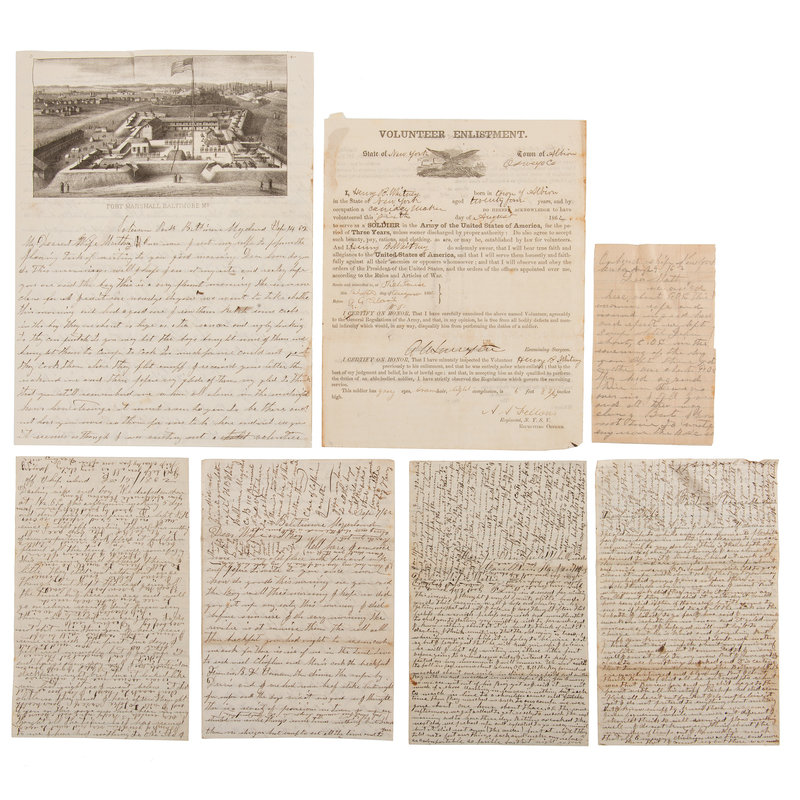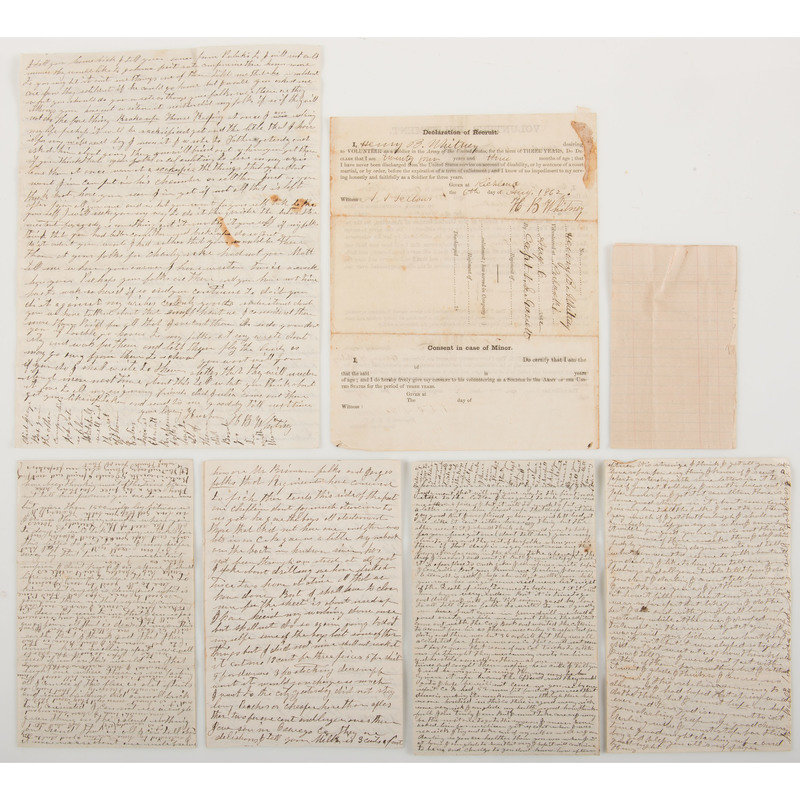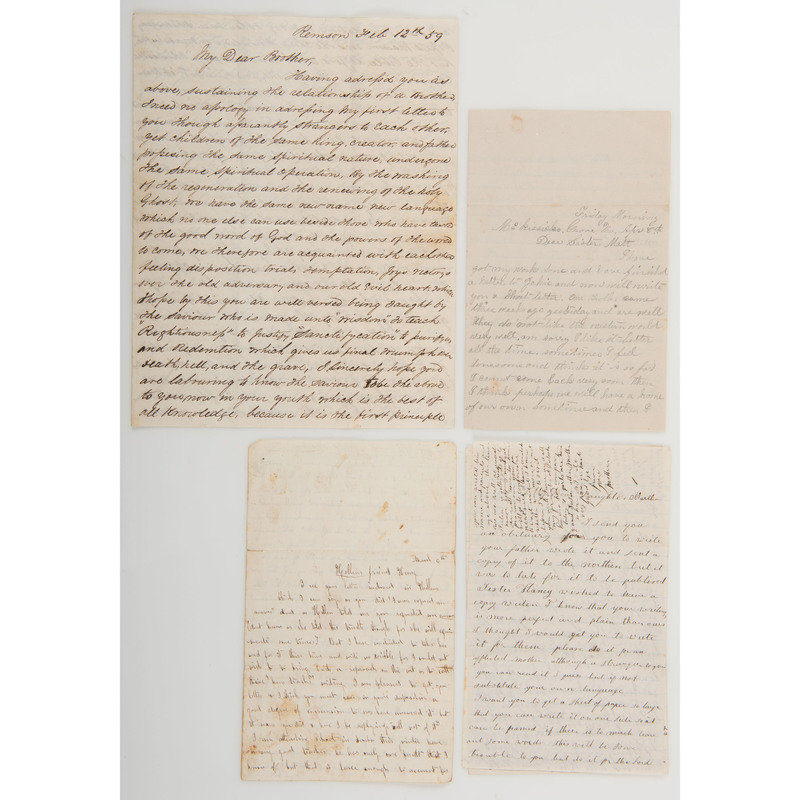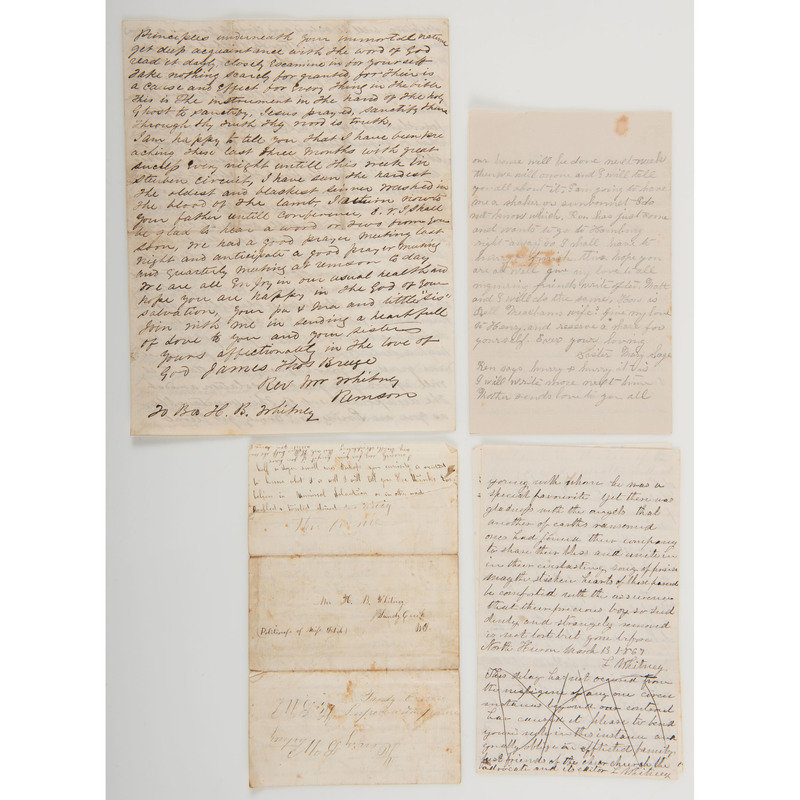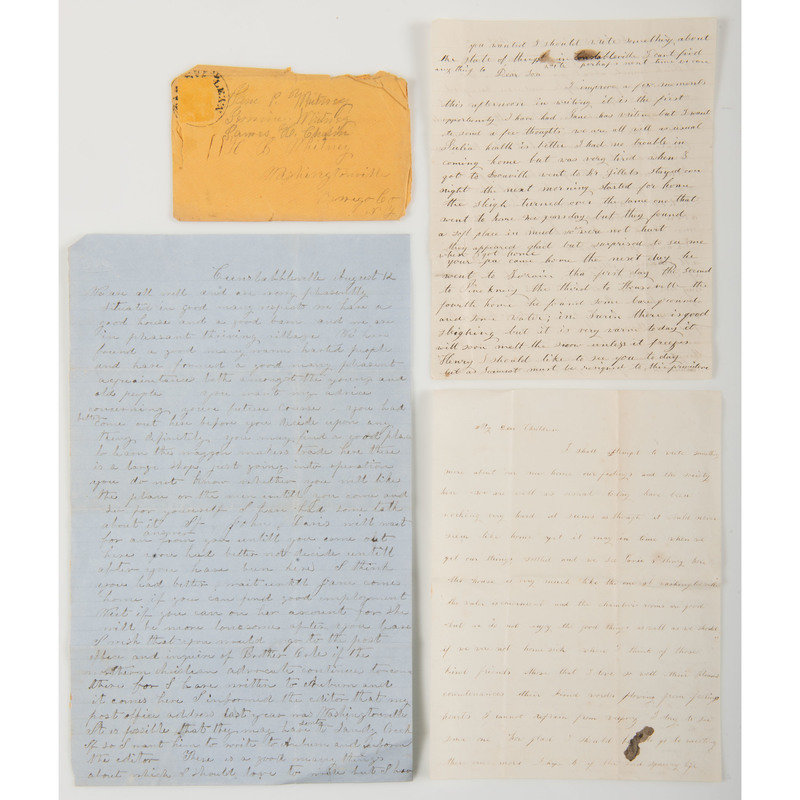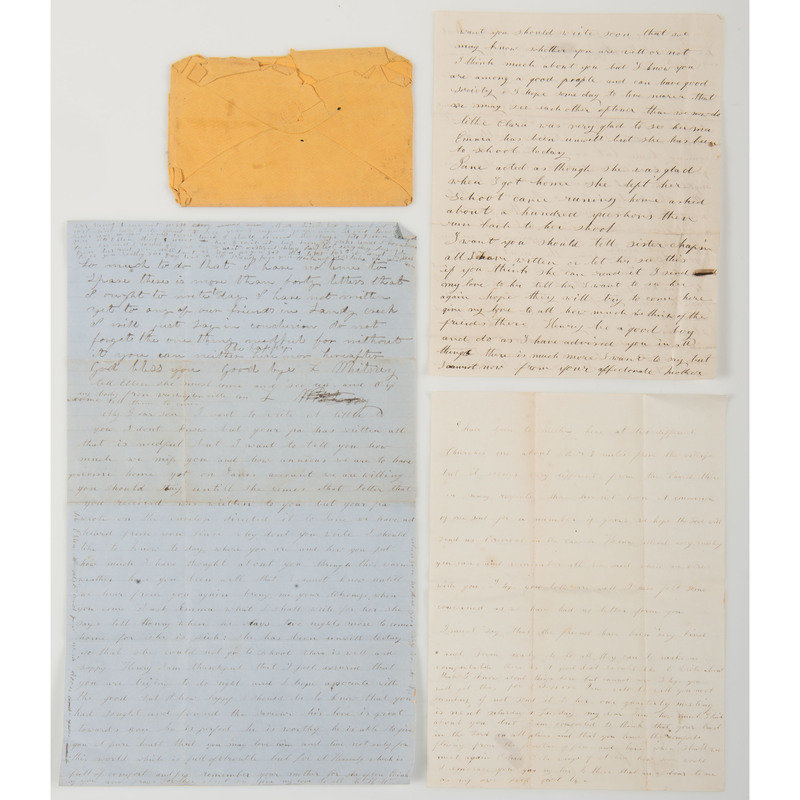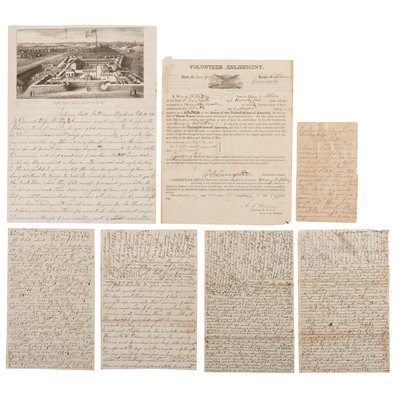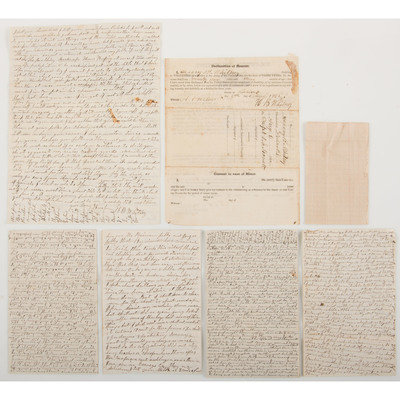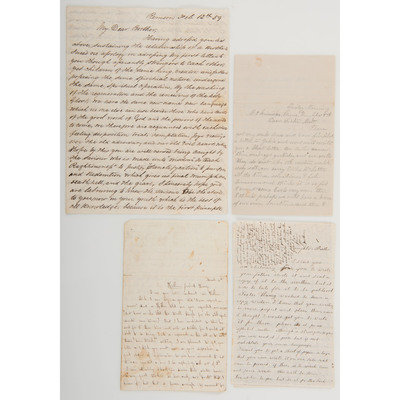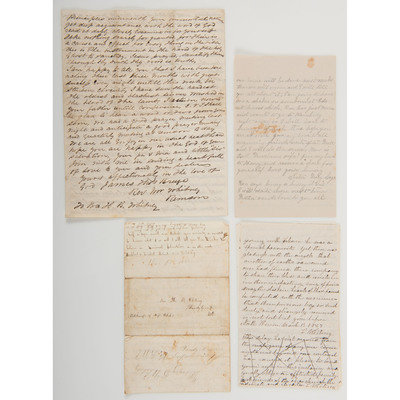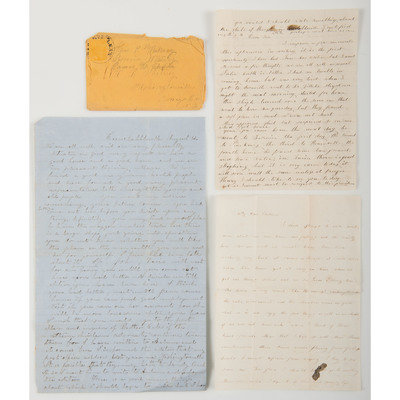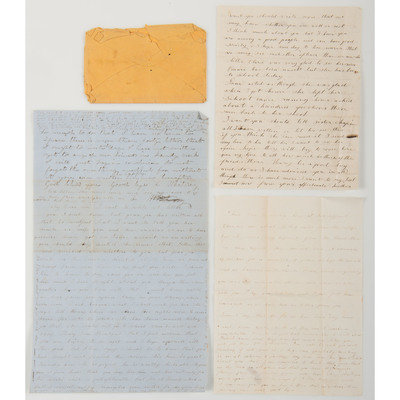Condition Report
Contact Information
Lot 82
Lot Description
Lot of approx. 260 letters from the entire extended family of Henry B. Whitney, who served with the 110th New York Volunteers. The archive contains approx. 47 letters dating from 1861-early 1862, before Whitney joined the war effort; approx. 56 war-date letters written by Henry B. Whitney, mostly to his wife, along with his his August 6, 1862 enlistment certificate in the 110th New York Infantry. It indicates that he was born in Albion, NY, was 24 years of age at the time of enlistment, and was employed as a carriage maker; approx. 82 letters, including a few poems and "meditations" from Martha / "Mattie" / "Matt" Whitney, dating from January 1862-August 1865. Far and away most are to Henry, or "My absent husband," or similar. Most have covers, and a few dates have been assumed from postmarks. Occasionally letters were written over several days and have intermediate dates; approx. 25 war-dated letters written by Whitney's sisters Julia and Emma, mother and father, cousin, etc. These are addressed both to Whitney and to others in the group; 13 pages which appear to be portions of other letters and covers. Writers include Henry's sisters Julia and Emma, mother and father, cousin, Matt's sister and cousin, etc. These are addressed both to Henry and to others in the group (the women write to each other frequently, for example); and approx. 50 post-war letters from siblings, cousins, parents, etc., nearly one third dating from 1870-1871. Accompanied by portions of letters and covers that do not seem to match up with the remainder of the archive.
One additional note about these letters - many are written as "normal," then turned upside down and written between the lines and in the other direction. They also filled in all margins (especially the top of the first page) with a few lines written around the border of a page. Spelling can be a challenge. The entire family does this. Whitney fills all possible space and occasionally adds additional slips of paper. Mattie fills every page and occasionally uses legal-sized paper. This archive could provide the owner with a lifetime of reading.
Henry B. Whitney was a 24-year-old carriage maker in Pulaski, New York who enlisted in the infantry in August 1862 as a private. On the 13th of August he mustered into Co. B, 110th NY VI, recruited primarily in Oswego Co. Whitney was married (Martha “Mattie” Smith Whitney) with an infant son, Charley (b. 1862) when he enlisted. Charley died April 30, 1863, at the tender age of 15 months, while Henry was serving in Louisiana. After the war the couple had two more boys, Fred (b. 1868) and Ernest (b. 1873).
The 110th was sent to Baltimore on the 29th of August, remaining there for a couple months until being sent to New Orleans in November. Their first experience under fire came at Fort Bisland and Franklin where it lost a dozen killed and wounded. It then took part in the siege of Port Hudson, losing another three dozen through the three month-long engagement. This operation finally secured control of the Mississippi River for the Union. The unit saw action in several battles in the swamps around New Orleans and Baton Rouge.
In February 1864 the 110th was sent to Fort Jefferson, Tortuga Islands (FL) to manage the prisoners, who were building and improving the fort while they were captive there. Later Dr. Samuel Mudd, who set John Wilkes Booth’s leg during his flight from Ford’s Theater, would become a prisoner in this fort. Although sentenced to a life term, Mudd would be pardoned by President Johnson and released in 1869. While at the Fort, he is credited with stemming the spread of a yellow fever outbreak in 1867, stepping in as the fort physician when the regular doctor himself died of yellow fever. Some think this contributed to his early release.
Whitney survived and the unit was mustered out on August 28, 1865.
In his early letters, Henry is becoming accustomed to army routines - up at dawn, breakfast, drill, guard duty, etc. A couple of the early letters have sections devoted to who cooks what. Apparently none of these guys learned to cook at home and now they have to figure it out. It seems to be a real stressor in the early days. When they leave New York, they head south on the USS Ericsson. We were unable to locate any ship by that name until 1897 when a torpedo boat was named for the designer (John Ericsson) of the USS Monitor. A number of Henry's letters have "Steamship Ericsson" as his location. She may have been a privateer or captured vessel.
{Some of his spelling retained for all of his letters to follow. His letters also have no punctuation and little capitalization; some of this has been inserted for clarity. Whenever he uses the article "a" it is attached to the following word. He also routinely adds "e" to the end of words - bad[e], glad[e], etc. Many homonyms are not distinguished. He seems to have only one spelling for each word (there = their, afare = affair, for ex.). Seldom are consonants doubled in words. } [Hampton Roads November 30, 1862]: "Last night in coming on board we ran close to one of those new Monitors, a big one not more than 50 feet I had a good sight of it. It was about 20 inches out of the watter. There was a good sea on and the waves ran ??? on the deack. It was some larger than the other. It was a harmless looking thing its bow was very sharp but to think that that was a big boat running in the watter with every thing under plating of ??n from 10 to 12 inches thick that no ball can penetrate with powerful ??? with nothing for the enemy to fire at but that turret."
"I go in for putting down this rebellion in the way they commenced it by the force of armes. it can be done. will it be done that is the question now. That is what I enlisted for is that your opinion still Darling. I have no ??? desire to distinguish myself in a batel But I am willing to take my chances with the rest be the consequences what they may but never for a setelment."
By December 15 they made it to Ship Island and three days later they were at Camp Mansfield, Carollton, LA. Henry writes that he thinks they will be there for about two weeks. They need the time to get in good shape physically and militarily. December 21 (less than one week later) they are sent to Baton Rouge. Then there is a gap of several months, with the next letters coming in mid-March.
[March 17, 1863, still in Baton Rouge or vicinity] “…keeping lookout awoke me to here the cannonading at P. V.C?? I can’t describe so I will not try. We was orderd to camp about 3 o.c. again there I had a pretty good nap. Then I got up to drink a cup of coffee when suddenly there was abright seen down the river then abroad sheet of flames filled with bright lights then came the report louder than all the canons I had heared put together it was the blowing up of the gunboat Mississippi so reported it was aground right I tell you Mattie I wish you could have seen it ."
[Marrch 22 B.R.] He had just received her letters dated February 25 and March 1. “I was startled some to read that Charley had had afit. Yes I asure you I was but you give so good and clear account of it I will try and not be alarmed I was glade you did tell me all about it so fully than you darling Yes I know very well you will do the best you can I have no fears on that account I would like to be there and help you take care of him. Yes oh! How much it is hard to be so far away from those we love when they are sick and I know that the young do die if it should be so But I cannot think of it no no I can not bare the thought but I will not murmer against the will of god….”
April 5 finds them in Algiers, LA. [April 18, 1863 in Camp 20 miles from Newtown, LA] He describes a battle in which he was apparently in reserve, but still had cannon balls whizzing by. At one point he notes that someone in Co. H was scratched by a piece of a shell, but not seriously hurt. “They have been marching us very fast for the last three days at the rate of 20 miles aday But we have been treading on there [the rebels’] heels. I tell you yesterday they took 100 baggage wagons from them our artillery pressed them so closet? They left them and run. They burnt the bridge acrost the Bayou and we are waiting to have it repaired now how ever we will be able I cant say but I have given you abrief a count of our afares…”
[Apr 28, 1863] “Yesterday Frank and I started out after diner to see if we could find for super we went down stream about one mile then way back to some negro huts and found about one doz. Eggs but we wer[e] not satisfied and they directed us to another house back still farther There we found two doz. More we payed for them in coffee. It is quite a treat to them it is worth from $4 to $5 per lb. and hard to be had at that. It is funey to meet the darkeys they all take off there hats when passing us the planters and all the inhabitents show the greatest possible respect for us taking special favor to acomadate us as give us any thing we want. They are colectors (?) in cotton pretty fast now there is from 15-20 teams at work the Q.Master takes the cotton and gives a receipt for it is they can show they are good ??? all right they all take ???as fast as they can at the chance now $10000 worth of cotton aint to be laughed at and now after the cotton is gone if the rebs get the day they are out so much out of pocket… the man that give me his my dinner said that his slaves had all gone but one and if they did not come back he should have to go out and hoe his own corn & he never did such a thing in his life he was a gentleman you see. I am not exaggerating at all neither do I tell extreme cases if I did it would astonish you to see the ut[t]er deference of the master…our guide is ??? his master was going to shoot him if he did not go to work. he left. he is worth every thing to the major.”
There is a gap in Mattie's letters between April 16 and June 5, 1863. This time frame is significant because of the loss of their son. She does note in the April 16 letter that Charlie had been "cross" for days and his gums are swollen (teething). ?). “The Dr. has been here and left some pills to quiet him and allay the fever he has a little and says it is his teeth and when they get through he will be all right. He told me I had better wean him for he did not think my milk was good for him and I shall next month. He also wanted to know if I had come around yet and I have not and I presume that is as much what makes Charlie sick as any thing.” Within two weeks he would be dead, but teething and her lack of periods are not likely the cause.
[May 5-7, 1863] “To day I am on guarding cotton it is very easy work all there is is to stay here in a yard with some fine shade trees & we are enjoying our selves. There is a little child here playing around. He makes me think of Charley. I guess Charley cant get around as fast as this one does light blue eyes light hair with a light fair skin as pure and white as mine yet he is a slave. I could not believe it but they all say so not a person in the world could tell this there was a particle of black blood in his veins. His mother is a fine looking muletto almost white his father a prominent lawyer of Opolousas now in the Rebel armey she was bought by her present master a few weeks ago. I don’t think she is even 16 years old…” Much of the letter is about slavery. He has not yet received the news of his son's death.
[June 12-13, 1863 Just right of the defences of Port Hudson] this is the first letter addressed only to Mattie, not to "Wife and boy" as so many of the early ones are. “…I think they are getting ready to do something in less than 48 hours. I think they will storm these works. What part in this afare we will take god onley knows. If I fall I pray god it may be at my post.” [June 13 - within the same letter] "Well the bombardment of Port Hudson has at last commenced. It has been going about one hour and there is aterible pounding, I tell you darling one continual boom boom boom mingled with the sharp crack of the rifled ones once in a while. There will be three or four go at a time it is almost deafening how long it will continue or its reparations I don’t know neither do I know the number of canons or masters but here are not a few I tell you. Frank came back last night after going and reporting there business is to carry stretchers in the cumming conflict perhaps they will carry me off I hope not there was a sad accident happened here this morning one of the boy(s) shot his thumb off accidently he was cleaning his gun the charge went very near his head that makes two in Co. B that are missing fingers by there own carlessness..."
There is another gap of several months. When the letters resume, Henry is in Church Hospital. The first letter from this location is dated September 5. On September 6 he is still in the same place: "Perhaps you would like to know something about the Hospital. There is 4 buildings occupied as H., large airy building with from 400 to 500 patients. The principle part are thare wounded at P.H. some with armes off some with legs it looks tugh (tough?) I tell you. There is all kinds of wounds how thankfull I am I am safe & sound no cripple for life yet one young man from near B____ had his foot off above the ancle his father came here to other day to take him home. There is a good many going on furloughs. There is but few discharged even those with arms & legs off go home on furloughs till they get well a good plan. they will never come back to this dept. but are drawing there pay the same. You must not wory about my being sick I don’t think you will more than you can help."
By the end of the month he had been moved to Arsenal Hospital in Baton Rouge. [October 13, 1863 New Orleans LA Convalescent Camp] “I got my discharge from the Hosp. & was ordered to report to the Head Surgeon of B.R. at 2 o.c. AM & in Co with 54 others of the 110 got our discharge from B.R.H. & about sundown we left there on a steamboat expecting to go direct to the Regt we wer detained by fog so that we did not arrive here till noon we wer marched up to Lieut Col. Smiths office for orders. While waiting the Lieut in charge (Garett of Co. G.) let us go to the market to get some dinner. We found every thing there hungry men could ask for & we did justice to it…"
After another two-month gap in dates, he writes from New Iberia, LA. [December 13, 1863] He gives a day-by-day account of his week. Thursday a forage train came in but their guide missed a landmark. “…we go in the mire horses & riders mules & teamsters. Capt. Brown & the adjt. Wer wet to there skin & came very close to loosing one of these horses…Then I went & helped them load & got aside back arrived in camp about 5 o.c. It was a cold side I wore my overcoat & was so cold I had to get out & walk to keep warm I enjoyed the ride finely for I did laugh to see our officers go over the horses head into the mud & see them search for solid footing. … it was cold. It froze ice nearly an inch thick." General Nathaniel P. Banks occupied New Iberia during the winter of 1862-1863. They suffered a wet freezing winter with freezing rain and mud making the business of foraging in the vicinity of camp even more unpleasant and difficult than the swamps did.
[Franklin LA, January 11, 1864] "...it is a long time since I have written a word to you since that time I have seen some hard service. We left new Iberia the morning of the 7 and marched about 13 miles over as bad a road as I ever saw mud ancle (ankle) deep which to gether with jumping ditches with our big knapsacks made it rather tegeous (tedious) yes it did I asure you of that we camped in a good place & passed the night very well we left that camp about sunrise & marched about 13 again it was a little better than the day before we came to a good camp about 3 o.c. There was nothing worth noticing that I saw. The country is desearted in good earnest I tell you. We left camp in good season & marched to F. over the worst road I ever see the mud was up to the hubs on the wheels & the watter was deep in the ditches side the road some of the boys went in to there waist it was froze or we could not have got through it would have been almost impossible. The trains & artillery. Another way (most of them) we arrived at our present camp about noon. Moris & I had just got our board & brick for our tent when I was called for picket so I slung my knapsack & off for picket we had a good place & I was on the reserve. I reckond on writing to you then but the next day was rainey & I could not. The cow boys frove a big drove of cattle by our post & told us to take one if we liked as they passed we put a bullet in a nice fat one but it did not stop he we followed her & got her from the drive when she turned for a fight then I gave her a shot back of the shoulder, she turnd at me and almost fell. Well I was in a fix a wounded cow as wild as a buffalo not a cattarage (cartridge) to load with for my straps wer at the part just there another gave her a shot in the neck and we come & gave me a cattarge at the same time & she turned at him in terrible rage. I droped on one knee took agood aim & shot her through the heart.…"
[January 12 (1864)] On page 5 he finally mentions the baby. He was telling his wife how happy he will be when their time is over, “…we can enjoy them as of old but there will be a vacant seat there our little one will not be there to liven the scene with his crowing happy smiles… "
In February 1864 the unit was reassigned to Fort Jefferson, Tortugas Islands, Florida.
March 6, 1864 – Tortugas Island Fort Jefferson – his last letter was from Key West. Since then “they up anchor & went up to the wharf to coal up. The Demolay was hauld up long side & we wer taken aboard her all our things wer transferred about 5 o.c. she was a smaller craft thanthe Merrimack & we wer some crowd. At 10 o.c. she cast loos & we wer off. She was a clumsy thing & before she got out of the harbor she almost rolled us out of bed by the way we lay on the second deck I expected to be sick but soon was off in dreamland. When I awoke next morning we wer rounding to the anchorage of the Tortugas…" He describes the fort: “The fort in the casemates about 16 feet square…The fort is for 2 tiers of casemate guns & on the parepet & when complete will mount about 300 guns maybe more. It is built of brick with awall out side & ditch about 25 or 30 feet wide. I don’t think it would stand much of our modern style of warfare…it would be stronger when batterd down than now. There is a good deal of building going on in & around the fort principaly by convicts they are building nice barracks for the men. The building for officers is finished now as a/mater of course there is lots of lumber & brick. There is several dwelling houses ocupyed by Engineers &c. There is about 1 dozen white women here. Every thing is like clock work & the convicts have to come to time & work…"
He mentions that there are trees and flowers there, including coconut trees. He is going to try fishing later, maybe from one of the nearby islands.
“There is no telling how long we will stay here but I shall not be surprised to finish my enlistment on this lsland or K.W. (Key West). True we may be relived (relieved) in less than one week so uncertain is military afares if I stay 3 months I will be satisfied. We have had no mail since leaving Algiers. It is about time it came around.”
He goes on to note that the men there say it is a healthy place and a good place for bathing. He expects the sea breezes to cure whatever ails him.
[Fort Jefferson March 12, 1864] He corrects his earlier assessment: “I told you the fort was 8 square it is but 6 square & will mount 850 guns when complete. I have counted so I know there is a marine on each side on top for the parepet guns. It is built with a roof like a house & is about 20 feet above the post. It is some thick & solid I tell you there is a coop (?) hole for the guners one for every 2 guns & they are safe from shot or shell. Out side there is angles running out so that they can rake the ditch & on each one of these is a 11 inch pivot…. Acrost the chanel is a shole surrounded by a long low sand bar in the shape of a horse shoe called hog island on that they are going to build a tamer? With a powerful battery in it they get all there sand on these sholes which is nothing more than sea shells ground up by the waves. It is capitol stuff for cement being about ¾ lime. The priseners go with flat boats after it the watter is about knee deep it looks funy to see them with there wheelbarrows going around in the water. It is nothing but fun for them the watter is warm.”
There is another gap here from May 18 to July 2. [Fort Jefferson July 14th] The noncommissioned officers sent a petition to the governor, but it is unclear what it was about. “…the officers were terribly worked up about it. They allowed they had no business to do it & at first were going to reduce them all had the ordileys all there to be ____ by the Maj. But to there surprise they found they wer dealing with men & wer not frightened at all further the entire Regt of ___ …& it has quieted down & no one has had there stripes taken off. It was not strictly in accordance with regulation….”
[July 27, 1864] "I hired a darky prisoner to wheel the barell of watter to night two of us. We gave him 5 each cheep I thought 40 gal. of water through this sand. I like you am not as strong as I was once. My hands are as tender & soft as yours. No work for two years. I have not been weighed in a long time….I have weighed over 145 since I have been a soldier…what a blessing health is exercise would soon fix my mussels (muscles) & sinews as well as ever I am thinking.”
By October 20 he is writing to his wife about missing the snow in the winter. He also is very concerned with the election (they are already voting). Before he is able to finish the letter, they have numbers for the 110th: 297 for Lincoln and 54 for McClellan. In his October 30 letter he mentions prices in Key West and at the Tortugas: apples - $10.00 / lb., onions - $9.00 / lb., potatoes - $8.00 / lb.
Christmas Eve some prisoners tried to escape. At least one died in a ditch. Whitney notes that he had not been robbed, there was no evidence of violence, and he did not drown (no water in his lungs at autopsy). The death remained a mystery.
There are a number of letters from Fort Jefferson, but most focus on how much he wants to go home (he had been gone over two years).
By summer, the guys are really "chomping at the bit" to go home, as many units were. The volunteer soldiers did not understand that they could not just walk away from an installation, even though all Confederate armies had surrendered. It takes some maneuvering to reassign another unit to take over the fort and its prisoner population. [July 20, Fort Jefferson] "...[T]here is no prospects of our immediate release & I am at a loss to account for it in any different than I did in my last [letter]....I am surprised to see how quick after the sentence those conspiraters wer executed.” [The four Lincoln conspirators were hanged July 7.] They finally left Florida about a month later and mustered out August 28 in New York. Shortly after they left, Dr. Samuel Mudd would have arrived. Tried with the Lincoln conspirators for setting Booth's broken leg during his flight from Washington, Mudd was sentenced to life in prison and sent to Fort Jefferson. While at the Fort, he is credited with stemming the spread of yellow fever in an outbreak in 1867, stepping in when the regular fort physician died of yellow fever. Some think this contributed to his pardon and release by President Johnson in 1869.
This lot is located in Cincinnati.
